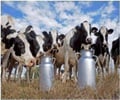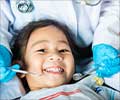The high consumption of cow’s milk products was linked to a heightened risk of developing type 1 diabetes in children who were genetically predisposed to the disease.

‘The processed cow’s milk with altered immunological properties may predispose to preclinical type 1 diabetes.’





“In terms of composition, milk is a very complex substance, and the factors in milk that may be associated with risk of diseases cannot be pinpointed based on the research conducted so far,” says Koivusaari.High consumption of milk in early childhood may potentially predispose people to type 1 diabetes has already been observed in prior studies.
In addition to type 1 diabetes, researchers investigated the link between cow’s milk products and the development of asthma in children.
The study found that the consumption of milk products subjected to high-temperature treatment, such as infant formula, was associated with a heightened risk of developing asthma.
A corresponding link was not observed in pasteurized milk products, in which case the treatment is less intense. The findings indicate that the processing of milk may alter its immunological properties.
Advertisement
According to researchers, further research is needed to understand whether the consumption of cow’s milk products predisposes to preclinical type 1 diabetes and that of infant formulas to asthma. It may also be that the explanation for the links observed is a factor that is yet to be identified.
In the study, data on the children’s diets were collected with the help of food records. Cow’s milk products were classified according to the adopted heat treatment and homogenization.
At intervals of 3–12 months, the study participants were monitored for the occurrence in blood samples of type 1 diabetes-related autoantibodies, which indicate prediabetes, and information on asthma was collected when the children were five.
Further studies should also determine which factor in milk may be connected to the risk of diseases for this to be taken into account in its processing.
Source-Medindia















